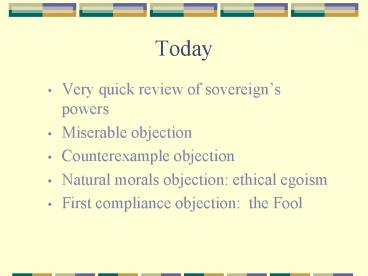Today PowerPoint PPT Presentation
1 / 27
Title: Today
1
Today
- Very quick review of sovereigns powers
- Miserable objection
- Counterexample objection
- Natural morals objection ethical egoism
- First compliance objection the Fool
2
- Its impossible for the sovereign to violate the
social contract. - All are under sovereigns power.
- The sovereign can never be guilty of injustice.
- The sovereign can never be punished in any way.
- The sovereign has absolute authority over
- peace and defense, speech, the press, property,
the legal system, the military, taxation,
government officials, the economy, status, honor,
and religion.
3
- Sovereigns Power
- Unconditional, Unlimited, Undivided
- There is no distinction between the person and
the office of the sovereign. - A kingdom divided in itself cannot stand.
4
Miserable Objection
- But a man may here object that condition of
subjects is very miserable, as being obnoxious to
the lusts and other irregular passions of him or
them that have so unlimited power in their
hands.
5
Hobbess response
- The worst government is still better than the
state of nature.
6
Hobbess response
- It is in the sovereigns own interests for his or
her subjects to be prosperous.
7
Counterexample Obection
- There are counterexamples to the Hobbesian choice
of state of war or absolute monarch.
8
- If there are such counterexamples to Hobbes, what
explains where Hobbes went wrong?
9
Natural Morals Obection
- There are natural moral principles that Hobbes
doesnt recognize.
10
- Psychological Egoism humans always do what they
think is in their own interests. - Ethical Egoism humans ought always to do what
really is in their own long-term rational
self-interests.
11
- Hobbess Ethical Egoism
- Humans ought always to do what will best promote
their own survival.
12
- The Hobbesian Right of Nature is the liberty
each man hath to use his own power, as he will
himself, for the preservation of his own nature,
that is to say, of his own life, and consequently
of doing anything which, in his own judgment and
reason, he shall conceive to be the aptest means
thereunto.
13
- There also exists the Law of Nature, by which a
man is forbidden to do that which is destructive
of his life or taketh away the means of
preserving the same, and to omit that by which he
thinketh it may be best preserved.
14
- How different is Hobbess ethical egoism from
commonsense? - Is it possible for a person to fail to live in
accord with Hobbess ethical egoism?
15
- Is self-interest really all there is to morality?
- When could killing an innocent person be right to
do and wrong not to do? - Do we lack all ultimate obligation to help or (at
least not hurt) others?
16
First Compliance Objection
- If human nature and morality are as selfish as
Hobbes says, how will we ever get out of the
state of nature?
17
Contract-Keeping Objection
- If human nature and morality are as selfish as
Hobbes says, how will we ever be able to have a
satisfactory reliance on people in the
commonwealth? - The Fool
18
- Hobbes defines justice as the keeping of
covenants. - Justice includes all those agreements, contracts,
and promises that enable people to cooperate with
each other and produce all the goods, services
and security that make society superior to the
state of nature.
19
- The Fool is someone who thinks he is better off
being unjust when he can get away with it. - The Fool is someone who thinks he should violate
his contracts when hell gain more by doing so
than by keeping them. - The Fool is someone who thinks he should cheat,
lie or steal when its in his own personal
interest to do so.
20
- The fool hath said in his heart there is no
such thing as justice and sometimes also with
his tongue, seriously alleging that every mans
conservation and contentment being committed to
his own care, there could be no reason why every
man might not do what he thought conduced
thereunto, and therefore also to make or not
make, keep or not keep, covenants was not against
reason, when it conduced to ones benefit.
21
- The fool thinks that the only reason to perform
an action is that it will promote his own good. - The fool thinks, therefore, that if he can
benefit from breaking a contract (if he can gain
an advantage from breaking it and not get
caught), he ought to do it. - Does Hobbes agree with the fool?
22
- Why does Hobbes think the Fool is wrong to commit
injustice?
23
Hobbess answer to the Fool
- The Fool can get away with injustice only if his
fellows err in their assessment of him. But
everyone is pretty much mentally equal, so
theres little reason to think the fool can trick
everyone all of the time.
24
Hobbess answer to the Fool
- If the Fool is caught, he may be expelled from
the commonwealth, placing him once again in a
state of nature. And if the fool is in a state
of nature vis-à-vis the rest of society, he may
easily be destroyed.
25
Hobbess answer to the Fool
- The risks of getting caught outweigh any
potential benefits of getting away with it.
26
- Is it really so difficult to get away with
injustice? - Might not the potential benefits sometimes be
worth the risk?
27
- Is the risk of being caught the only reason not
to be unjust? - Might there be some moral imperative besides
self-interest? - Does Hobbess view of morality and human nature
really capture everything we think about those
topics? Or is he too selfish and negative? - (This relates to the counterexample, first
compliance, and natural morals objections.)

